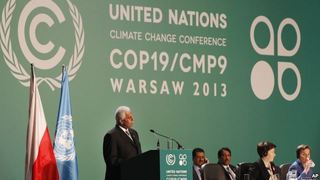Thursday, November 21, 2013
Lack of Coverage of Warsaw Climate Conference Does Not Bode Well
The devastation from the recent typhoon that hit the Philippines according to the country's lead negotiator at the United Nations climate summit in Warsaw, Naderev Sano,“was [like] nothing we have ever experienced before, or perhaps nothing that any country has ever experienced before”.
Despite the thousands of people killed and Sano's plea to nations to act on climate change and prevent super typhoons such as Haiyan, from becoming “a way of life” the UN Conference on Climate change in Warsaw seems currently deadlocked.
The UN climate change summit going on now in Warsaw might as well be occurring on an alternative universe. There is no coverage in the mainstream press. The news today of a walk out among
"hundreds of environmental activists over the absence of a binding agreement on curbing global warming coming on the heels of a group of 133 developing nations walking out of a key negotiating meeting about how much of the burden developed economies must pay for the cost of the damage they have caused seems to suggest deadlock is now inevitable. According to one source
"The paper makes it clear that, despite President Barack Obama's progressive stances on climate issues over the past year, the US continues to pose difficulties to closing an international global climate deal by strongly resisting the concept of historical responsibility for emissions and positioning itself in opposition to developing countries on the main issues at stake."
The memo is indicative as to how many western governments are now turning their backs on climate change. As the Guardian has reported,
"Recent decisions by the governments of Australia, Japan and Canada to downgrade their efforts over climate change have caused panic among those states most affected by global warming, who fear others will follow as they rearrange their priorities during the downturn.
In the last few days, Japan has announced it will backtrack on its pledge to reduce its emission cuts from 25% to 3.8% by 2020 on the basis that it had to close its nuclear reactors after the 2011 earthquake and tsunami.
Australia, which is not sending a minister to this weekend's talks, signaled it may weaken its targets and is repealing domestic carbon laws following the election of a conservative government.
Canada has pulled out of the Kyoto accord, which committed major industrial economies to reducing their annual CO2 emissions to below 1990 levels.
These governments as well as the US have been allowed to get away with it by a compliant media that is owned in large part by corporate interests. If there is to be real change in terms of addressing the climate crisis it has to come from the grassroots. Even though the NGOs are walking out of Warsaw only after mobilizing a sleepy public and a negligent media.
Labels:
climate change,
Climate crisis,
NGOs,
Oxfam,
Philippines,
Typhoon,
UN
Subscribe to:
Posts (Atom)
